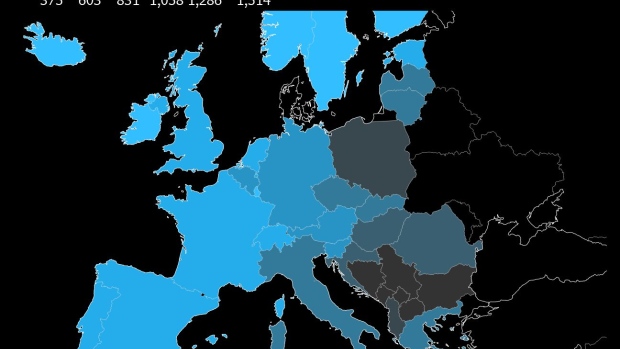Poles are burning trash to stay warm this winter
(Bloomberg) – When Paulina Mroczkowska noticed a pile of trash growing in the yard of a carpentry shop across the street, alarm bells rang. His concern was not about the dangers of uncollected waste, but how it was going to be used.
Poland is home to 40 of the 100 cities with the worst air quality in the European Union due to a reliance on coal to heat homes, a legacy from the communist era that banned mining. But now fuel shortages and soaring costs of living are prompting people to burn alternatives, including household waste.
“It’s so bad this season that you can smell burning garbage every day, which is completely new,” said Mroczkowska, 35, a mother of three from Jablonna, in the northern suburbs of Warsaw. “You can rarely smell regular fuel. It’s scary to think what happens when it’s really cold.
While Russia’s war in Ukraine reveals the fragility of Europe’s energy security, Poland faces another level of risk: that pollution control efforts will regress in a country where the prevalence of premature deaths linked to contaminated air is among the highest on the continent.
The government, which has temporarily suspended coal quality checks, plans to distribute protective masks as the temperature drops. Last month, Law & Justice leader Jaroslaw Kaczynski, the country’s most powerful politician, suggested people do whatever it takes to warm up. He told his supporters at a rally in Nowy Targ, southern Poland, that “almost everything has to be burned, except for tires and equally harmful things.”
Some municipalities have relaxed environmental restrictions introduced in recent years. The Malopolska Regional Assembly in Krakow, which is controlled by the ruling Law and Justice party, voted last month to delay a ban on kilns, allowing everything from coal to garbage to be burned until early 2024 Before the pandemic, police in Krakow began deploying drones with cameras to check chimneys from above for signs that home furnaces were illegally burning trash.
Poland’s experience with smog is not on the same scale as parts of the Balkans like Bosnia and Herzegovina. But Poland’s use of coal makes it an exception among the 27 EU members, even as it promises to stop using the fuel for power generation by 2050. The country of 38 million inhabitants represents 77% of all households in the EU that use coal for heating.
Despite President Andrzej Duda’s assurances that Poland has enough coal to last 200 years, the nation has become dangerously dependent on supplies from Russia. When the government decided in April to ban Russian coal, it resulted in long lines of trucks outside the mines.
Surveys show that 60% of households don’t have enough coal to get through the winter, according to Piotr Siergiej, spokesman for a network of environmental activists called Polski Alarm Smogowy – or Polish Smog Alert. “People are scared and pick up anything that can be used to burn,” he said.
This includes lignite, timber, peat, oats and waste. Nowy Sacz, about 100 kilometers (62 miles) southeast of Krakow, faces an ‘unprecedented’ situation where the city is now collecting less waste than at the same time last year, mayor says Ludomir Handzel. It’s in a location that was ranked last year as the most polluted out of 334 cities tracked by the European Environment Agency.
“We are seeing a significant drop in garbage collection, especially when it comes to materials that could at least theoretically be suitable for combustion such as paper, cardboard and packaging,” Handzel told the news outlet. TVN24 information. “We will fine those who try to poison us and our children.”
The industry group representing waste management companies said it was too early to draw conclusions from the drop in waste amounts. This could be due to a drop in consumption rather than use for illegal burning, he said by email.
Poland has recorded around 40,000 premature deaths linked to air pollution each year in recent years, the highest number per capita in the EU after Bulgaria. Kamil Sukiennik, who is also active with Polski Alarm Smogowy and lives in Nowy Dwor outside Warsaw, said smog in his neighborhood comes from people turning on their ovens in the evening. The pungent smell is already being felt now, in early fall when the mercury hasn’t plunged yet.
“Through their comments, the government and Kaczynski have effectively declared war on me and the entire community trying to take care of clean air,” Sukiennik said. “We are not going to tolerate this.”
Some families do not wait for the government to act. This year, Brimmu, a Warsaw-based startup, started marketing a cover for strollers with an integrated air filtration system and the demand for them is growing.
Katarzyna Mardeusz-Karpinski decided to start the business with her husband in Warsaw five years ago when their son was born and they couldn’t take him for a walk after an alert about the poor quality of the air.
“We’re seeing a lot of interest from parents who are worried about smog this winter and want to protect their newborns,” she said. “There was light at the end of the tunnel until recently and we could hope that the air quality would improve. But everything now suggests that it could really get worse.
©2022 Bloomberg LP


Comments are closed.